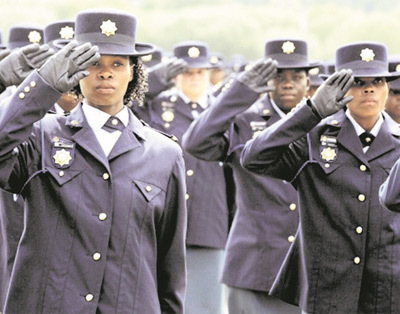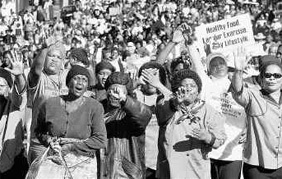| The Gains and the Challenges | |||
Not bad, especially for a country where not so long ago the prevailing attitude was that the place of a woman was in the kitchen, and, often, a few paces behind the man (literally). Since the watershed democratic elections of 1994 many laws have been passed to oust gender discrimination. On paper, South Africa has one of the most progressive legal frameworks for protecting women's rights. However, the gap between principle and practice persists, and in real life South African society is still largely a conservative, patriarchal one. In some areas, particularly in politics, women are doing well. In economy, less so. A 2013 PricewaterhouseCoopers (PwC) report puts the female representation in 373 companies listed on the Johannesburg Stock Exchange (JSE) at the very low 10%, though this is still an improvement in comparison with the 2012 and 2011 figures, which were 8% and 4.2% respectively. The PwC report cites the statistics from the South African Revenue Service which show that in 2011 women earned an average taxable income of R160,702, while men made R223,550. The participation of women in the formal economy is lower than that of men. Women make up 52% of the population, but only 44% of the workforce. Furthermore, about 20% of the working women are domestic workers, says Shireen Chengadu, executive director at the University of Pretoria's Gordon Institute of Business Science. She says that women earn on average 18% less than men across all occupations and estimates that it will take 45 years for them to reach pay parity with men. It’s anybody’s guess how long it will take to conquer the most persistent area of gender inequality the world over, the home and family front. | During the 19 years of democracy, South African society has made important strides towards gender equality. However, numerous challenges still remain, from the salary gap to the high incidence of violence against women. That is why Minister of Basic Education Angie Motshekga says in her foreword to the educational booklet For Freedom and Equality - Celebrating Women in South African History that it would be disingenuous to suggest that the battle against patriarchy has been won in democratic South Africa: “If anything, like racism, the evil of patriarchy still lives amongst us and often within us. It is against this background that we have to be even more vigilant that the gains made in the post-apartheid era are not unwittingly rolled back”, she points out.
Women on Top The list of notable contemporary South African women is a long one. Here is a short cross-section of only some of them: Phumzile Mlambo-Ngcuka: The first woman Deputy President of South Africa (2005-2008). Frene Ginwala: The first Speaker of Parliament elected by universal suffrage in 1994 and the first woman in that position in South Africa. Nkosazana Dlamini Zuma:The first woman to chair the African Union executive committee. Wendy Luhabe: Self-made businesswoman, one of the most powerful in the country. Founded women’s investment group Wiphold, which was the first women-owned company to list on the JSE. Thuli Madonsela: Public Protector known for her courageous and uncompromising stance. In 2012, the Press Club named Madonsela Newsmaker of the Year. Dr. Patience Mthunzi: Biophotonics researcher named on Forbes Magazine’s 2012 list as one of the 20 “Youngest Power Women in Africa”. Gill Marcus: The ninth governor of the South African Reserve Bank and the first woman to hold this position. Nicky Newton-King: The first woman to run the Johannesburg Stock Exchange, Africa’s largest, in its 124-year history. Helen Zille: The leader of the opposition Democratic Alliance party and premier of the Western Cape, Helen Zille is South Africa’s most visible female politician. Dr. Mamphela Ramphele: An academic, a businesswoman, and as of mid-2013 a politician whose party, Agang, has the ambition to challenge the ANC and - who knows? – perhaps one day install Dr. Ramphele as the first female president of South Africa. | ||
 | |||
| |||


 The Female Power
The Female Power